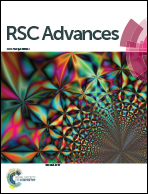Enhancing capacitance of supercapacitor with both organic electrolyte and ionic liquid electrolyte on a biomass-derived carbon†
Abstract
Supercapacitor (SC) with organic electrolyte or ionic liquid (IL) electrolyte can generally store/release higher energy than that with an aqueous electrolyte, due to a larger operating voltage window of a non-aqueous electrolytes. A carbon is synthesized by a facile impregnate-activation method from renewable woody biomass, which has twice of the specific surface area and pore volume than the sample synthesized by conventional KOH activation. Biomass-derived carbons with high ion accessible surface area and highly integrated micropores and mesopores provide superior capacitance, excellent rate capability and good stability in both organic electrolyte and IL electrolytes. Significant enhancement in the capacitance and rate capability were obtained by the generation of micropores similar to the ion size and better pore network through removal of impurities in the biomass. High specific capacitances of 146 F g−1 in the organic electrolyte and 224 F g−1 in the IL electrolyte at current density of 0.1 A g−1 are achieved. Highly integrated micro- and mesoporous structure leads to a good rate capability of 100% capacitance retention at current density up to 10 A g−1 in the organic electrolyte and 67% capacitance retention at current density up to 7 A g−1 in the IL. With the large voltage offered by the non-aqueous electrolyte, the material can store/release high maximum energy of 26 W h kg−1 and 92 W h kg−1 in the organic electrolyte and IL electrolyte, respectively. It reveals that the biomass derived carbon is a promising and cost effective candidate for electrodes in high performance SCs.



 Please wait while we load your content...
Please wait while we load your content...